#OpenSourceDatabases
Explore tagged Tumblr posts
Text
Expert PostgreSQL Consultants in the USA
RalanTech offers premium PostgreSQL consultants in the USA, helping organizations unlock the full potential of their open-source database systems. Whether you need help with performance tuning, architecture optimization, or high availability configurations, our expert consultants ensure your PostgreSQL environment operates at peak efficiency. With a client-first approach, we deliver custom strategies that align with your data goals and technical requirements.

PostgreSQL is a powerful and reliable database system, but to maximize its capabilities, specialized consulting is essential. Our PostgreSQL consultants offer services including database audits, migration planning, backup and recovery strategies, and security enhancements. Leveraging years of hands-on experience, we help reduce downtime, mitigate risks, and improve query performance, ensuring your system is robust and scalable for the future.
0 notes
Text
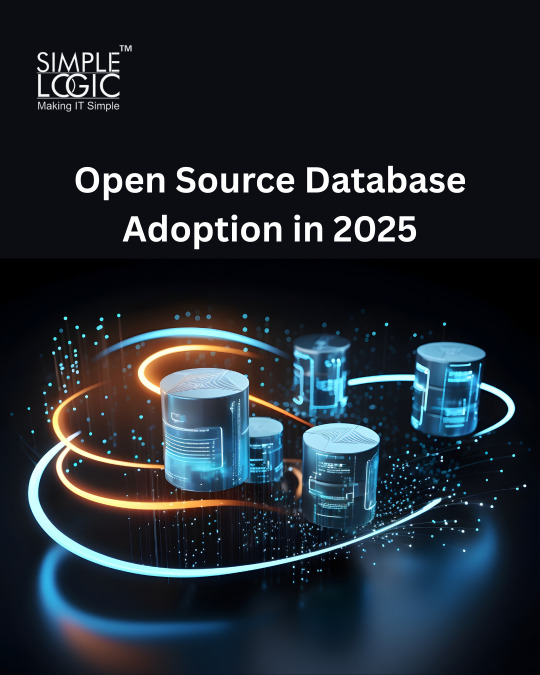
Open Source Database Adoption in 2025: Are You Ready? 🐘💡 Open source databases are no longer just an alternative they’re becoming the preferred choice for enterprises in 2025. From flexibility to cost efficiency and community backed innovation, the shift is happening fast! 🚀
👉 Check out the full blog📖 https://simplelogic-it.com/open-source-database-adoption-in-2025/
📚 Learn more about Open Source Database Management 👉 https://simplelogic-it.com/open-source-database-management/
📞 Get in touch with our experts 👉 https://simplelogic-it.com/contact-us/
📌 Explore more insights: https://simplelogic-it.com/
#OpenSourceDatabase#DatabaseAdoption2025#PostgreSQL#MySQL#DatabaseInnovation#TechTrends2025#EnterpriseIT#DatabaseManagement#MakeITSimple#SimpleLogicIT#SimpleLogic#MakingITSimple#ITServices#ITConsulting#testyourknowledge
0 notes
Text
Yearly MariaDB LTS Release Integrates Vector Search: A New Era for Databases
The Yearly MariaDB LTS Release Integrates Vector Search, marking a pivotal moment for MariaDB users. Announced in June 2025, MariaDB Community Server 11.8 brings vector search capabilities to its long-term support (LTS) edition, offering stability and innovation for AI and machine learning applications. This release not only enhances traditional relational database features but also opens doors to advanced similarity search, making it a versatile tool for modern data needs.
What Is Vector Search and Why Does It Matter?
Vector search is a method of querying data based on similarity rather than exact matches. It uses high-dimensional vectors—numerical representations of data like text, images, or audio—to find semantically similar items. This capability is crucial for applications like recommendation systems, semantic search, and anomaly detection.
The Role of Vectors in AI
In AI, vectors capture the essence of data. For example, a sentence like “I love coffee” might be transformed into a vector that encodes its meaning. By comparing vectors, databases can identify related content, even if the wording differs. MariaDB’s vector search leverages this to enable faster, more intuitive queries.
Why Integrate Vector Search in a Relational Database?
Unlike standalone vector databases, MariaDB combines vector search with relational data management. This unification simplifies infrastructure, reduces costs, and ensures data consistency. Developers can store embeddings alongside traditional data, streamlining workflows for AI-driven projects.
MariaDB 11.8 LTS: A Closer Look at the Release
MariaDB 11.8, the 2025 LTS release, is packed with features, but vector search steals the spotlight. Available since June 2025, this release ensures five years of support, making it ideal for enterprises seeking stability.
Key Features of MariaDB Vector Search
Native VECTOR Data Type: MariaDB introduces a dedicated data type for storing vectors, simplifying the management of embeddings.
Specialized Indexing: Using a modified Hierarchical Navigable Small World (HNSW) algorithm, MariaDB offers fast nearest-neighbor searches.
Similarity Functions: Functions like VEC_DISTANCE_EUCLIDEAN and VEC_DISTANCE_COSINE calculate vector distances, supporting diverse use cases.
Hardware Optimizations: Support for Intel, ARM, and IBM Power10 CPUs ensures high performance.
Other Enhancements in 11.8 LTS
Beyond vector search, MariaDB 11.8 includes improved JSON functionality and temporal tables for auditing. These updates make it a robust choice for developers handling complex datasets.
Practical Applications of Vector Search in MariaDB
The integration of vector search in MariaDB 11.8 LTS unlocks a range of possibilities for businesses and developers. Here’s how it’s being used:
Building Smarter Recommendation Systems
E-commerce platforms can use vector search to suggest products based on user behavior. For instance, a customer browsing coffee machines might see recommendations for coffee beans, thanks to vector similarity.
Enhancing Semantic Search
Search engines powered by MariaDB vector search can understand user intent better. A query like “best coffee shops” could return results for “top cafes” or “cozy coffee spots,” improving user experience.
Supporting AI-Driven Analytics
Data scientists can leverage vector search for clustering and anomaly detection. For example, financial institutions might identify unusual transactions by comparing vector representations of user activity.
Benefits of Choosing MariaDB 11.8 LTS for Vector Search
MariaDB’s approach to vector search offers distinct advantages, making it a compelling choice for organizations.
Simplified Infrastructure
By integrating vector search into a relational database, MariaDB eliminates the need for separate systems. This reduces complexity, lowers maintenance costs, and ensures seamless data governance.
High Performance and Scalability
Benchmarks show MariaDB’s vector search outperforms alternatives like pgvector, delivering higher queries per second (QPS) with comparable recall. Its hardware optimizations further boost efficiency.
Open-Source Advantage
As an open-source solution, MariaDB 11.8 LTS is accessible to all, unlike proprietary alternatives. This fosters community contributions and ensures transparency.
How to Get Started with MariaDB Vector Search
Ready to explore vector search in MariaDB 11.8 LTS? Here’s a quick guide to get you started:
Upgrade to MariaDB 11.8
If you’re using an older version, upgrading to 11.8 is straightforward. MariaDB supports upgrades from versions as old as 10.0, ensuring compatibility.
Set Up Vector Columns
Add a VECTOR column to your tables to store embeddings. Use functions like VEC_FromText to populate it with data from your AI model.
Create Vector Indexes
Implement a VECTOR index with the HNSW algorithm to enable fast similarity searches. Tune parameters like M for optimal performance.
Query with Similarity Functions
Use VEC_DISTANCE functions to query similar vectors. For example, find products with embeddings closest to a user’s preferences.
Challenges and Considerations
While MariaDB’s vector search is powerful, there are a few considerations to keep in mind:
External Embedding Generation
MariaDB doesn’t generate embeddings internally, requiring integration with external AI models like those from Hugging Face. This adds a step to the workflow.
Documentation Gaps
Some users note that MariaDB’s vector search documentation could be more detailed. However, community resources and blogs are filling this gap.
The Future of Vector Search in MariaDB
MariaDB’s commitment to vector search signals a bright future. Planned enhancements include support for additional distance metrics and deeper integration with AI frameworks. As AI adoption grows, MariaDB is poised to remain a leader in relational databases with vector capabilities.
Why MariaDB 11.8 LTS Is a Must for Developers
The Yearly MariaDB LTS Release Integrates Vector Search, offering a powerful blend of stability and innovation. Whether you’re building recommendation engines, semantic search tools, or AI analytics platforms, MariaDB 11.8 LTS provides the tools to succeed. Its open-source nature, high performance, and simplified infrastructure make it a top choice for developers and businesses.
#MariaDB#VectorSearch#DatabaseInnovation#LTSDatabase#MariaDBRelease#DatabaseTechnology#DataManagement#OpenSourceDatabase#TechInnovation#DatabasePerformance
0 notes
Text
MySQL database courses Coding Bit
MySQL database courses is an open-source relational database management system (RDBMS) based on Structured Query Language (SQL). It is used to store, manage, and retrieve data for websites and applications. MySQL is known for its speed, reliability, and ease of use, and is widely used with web technologies, especially PHP.
Key Features:
Relational database: Organizes data in tables with rows and columns.
SQL support: Uses SQL for querying and managing data.
Open-source: Free to use under the GNU General Public License (GPL).
Cross-platform: Runs on Windows, Linux, macOS, etc.
Scalable: Suitable for both small and large applications.
Secure: Supports user access control and encryption.
Common Uses:
Websites (e.g., with WordPress, Joomla)
Web apps (e.g., e-commerce, blogs)
Data warehousing
Logging systems 📞 Phone Number: +91 9511803947 📧 Email Address: [email protected]
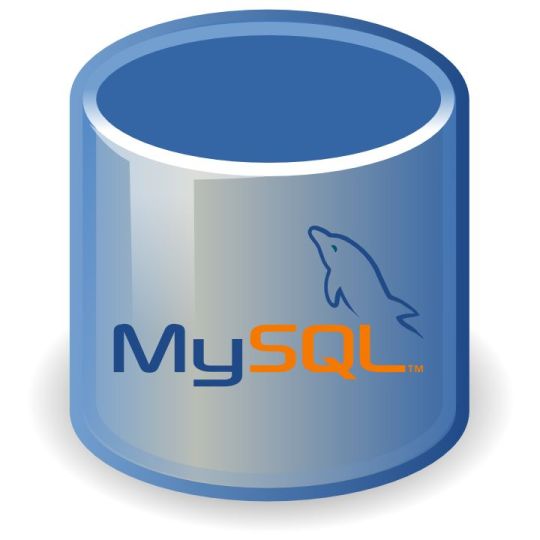
#MySQL#Database#SQL#RelationalDatabase#MySQLDatabase#SQLQuery#OpenSourceDatabase#DataManagement#MySQLTips
0 notes
Text
CockroachDB 23.1.11 / 22.2.14
Het team achter CockroachDB heeft twee nieuwe versies uitgebracht met 23.1.11 en 22.2.14 als de versienummers. Dit is een opensourcedatabase die uitermate geschikt is voor cloudomgevingen en die verschillende opties voor het opvangen van problemen in de bijbehorende verspreide data biedt. Voor meer informatie verwijzen we naar deze pagina, waar de meestgestelde vragen worden beantwoord. De lijst met aanpassingen van deze uitgaves ziet er als volgt uit: What's New in v23.1.11 Note: v23.1.11 is currently available only on select CockroachDB Dedicated clusters. If you wish to upgrade your Dedicated cluster to v23.1.11, please submit a support request. This release is currently not available for CockroachDB Serverless or Self-Hosted customers. SQL language changes http://dlvr.it/SwdCr2
0 notes
Text
CockroachDB 2.1.1
Het team achter CockroachDB heeft versie 2.1.1 uitgebracht. Dit is een opensourcedatabase die uitermate geschikt is voor cloudomgevingen en die verschillende opties voor het opvangen van problemen biedt, dankzij de verspreide opzet. Voor meer informatie verwijzen we naar deze pagina, waar de meest gestelde vragen worden beantwoord. De lijst met veranderingen ziet er als volgt uit: What's New in v2.1.1 SQL language changes http://dlvr.it/Qrhgd1
0 notes
Text
Why Open Source Database Adoption is Accelerating in 2025
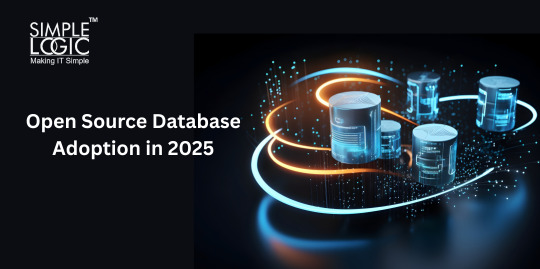
In 2025, open source databases have officially moved from niche solutions to mainstream enterprise choices. With the ever-growing need for scalable, cost-efficient, and flexible data management systems, organizations are increasingly turning toward open source database management solutions to drive innovation and reduce vendor lock-in. From MySQL to PostgreSQL and MongoDB, the popularity of these platforms has surged across industries.
But why are so many businesses making the switch now? Let’s explore the growing adoption of open source databases, their features, benefits, and how to implement them in your IT ecosystem.
Key Features of Open Source Databases
✔️ Source Code Access – Modify and optimize your database to suit your business logic. ✔️ Community-Driven Development – Get regular updates, security patches, and support from global communities. ✔️ Cross-Platform Compatibility – Open source databases are platform-independent and highly portable. ✔️ Support for Advanced Data Models – Handle structured, semi-structured, and unstructured data easily. ✔️ Integrations and Extensions – Access a variety of plug-ins and connectors to expand functionality.
Why Open Source Database Adoption is Booming in 2025
💡 1. Cost-Effectiveness
No hefty licensing fees. Businesses save significantly on software costs while still getting robust features.
⚡ 2. Flexibility and Customization
Developers can fine-tune the database, adjust configurations, or build new functionalities—something proprietary systems limit.
🔒 3. Strong Security and Transparency
With open source, vulnerabilities are exposed and fixed faster thanks to large developer communities.
🚀 4. Scalable for Modern Applications
Whether it's IoT, big data, or AI-driven apps, open source databases scale well horizontally and vertically.
🌐 5. No Vendor Lock-In
Businesses can avoid being stuck with a single provider and switch or scale as needed.
Steps to Successfully Adopt an Open Source Database
✅ Step 1: Evaluate Your Current Infrastructure
Understand your existing data structure, workloads, and performance needs.
✅ Step 2: Choose the Right Database (MySQL, PostgreSQL, MongoDB, etc.)
Pick a database based on your data type, scale, transaction needs, and technical stack.
✅ Step 3: Plan Migration Carefully
Work with experts to move from proprietary systems to open source databases without data loss or downtime.
✅ Step 4: Monitor & Optimize Post-Migration
Use tools for performance monitoring, indexing, and query optimization to get the best out of your new setup.
Real-World Use Cases of Open Source Databases
🏥 Healthcare: Managing patient data securely and affordably. 🛍️ E-commerce: Handling high transaction volumes with scalable databases. 💼 Enterprises: Leveraging PostgreSQL and MySQL for internal applications. 📱 Mobile Apps: Using MongoDB for flexible and fast mobile backend support.
FAQs on Open Source Database Adoption
❓ Are open source databases secure for enterprise use?
Yes, most modern open source databases are highly secure with active communities and regular updates.
❓ What are some top open source databases in 2025?
PostgreSQL, MySQL, MariaDB, MongoDB, and Apache Cassandra are leading the pack.
❓ Will I need in-house expertise to manage it?
Not necessarily. You can always work with managed service providers like Simple Logic to handle everything from setup to optimization.
❓ Can open source databases support enterprise-scale apps?
Absolutely! They support clustering, replication, high availability, and advanced performance tuning.
❓ How can I migrate from my current database to an open source one?
With expert planning, data assessment, and the right tools. Reach out to Simple Logic for a guided and smooth transition.
Conclusion: Future-Proof Your Business with Open Source Databases
Open source databases are no longer a tech experiment—they're the backbone of modern digital infrastructure. From scalability to security, businesses in 2025 are realizing the value of making the shift. If you're still relying on outdated, expensive proprietary databases, it’s time to explore smarter, more agile options.
✅ Ready to Embrace Open Source? Let’s Talk!
Whether you’re planning to adopt PostgreSQL, MySQL, or any other open source database, Simple Logic offers expert guidance, migration support, and performance tuning to ensure a seamless experience.
📞 Call us today at +91 86556 1654 🌐 Visit: www.simplelogic-it.com
👉 Don’t just follow the trend lead with innovation! 🚀
https://simplelogic-it.com/open-source-database-adoption-in-2025/
#OpenSourceDatabase#DatabaseAdoption2025#PostgreSQL#MySQL#DatabaseInnovation#TechTrends2025#EnterpriseIT#DatabaseManagement#MakeITSimple#SimpleLogicIT#SimpleLogic#MakingITSimple#ITServices#ITConsulting
0 notes
Text
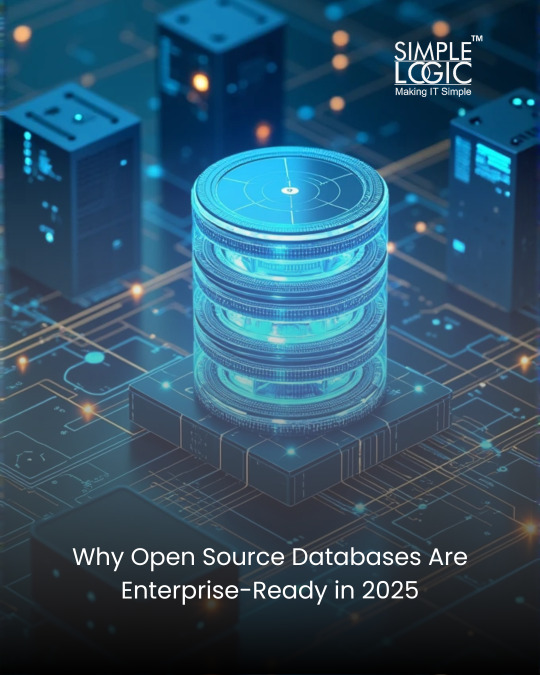
Are Open Source Databases Are Enterprise Ready in 2025 🏢🐘 Think open source is only for small projects? Think again! From scalability to security, Open Source Databases are now powering mission critical enterprise systems. 💡
Learn why 2025 is the turning point for businesses to embrace open source innovation! 🚀
📖 Read here 👉https://simplelogic-it.com/open-source-databases-for-enterprises-2025/
📚 Want to learn more about Open Source Database Management? Click here 👉 https://simplelogic-it.com/open-source-database-management/
📞 Get in touch with our experts 👉 https://simplelogic-it.com/contact-us/
📌 Explore more insights: https://simplelogic-it.com/
#OpenSourceDatabase#EnterpriseIT#DatabaseManagement#TechTrends2025#PostgreSQL#MySQL#BusinessGrowth#MakeITSimple#SimpleLogicIT#SimpleLogic#MakingITSimple#ITServices#ITConsulting
0 notes
Text
🌟 Why Choose Open Source Databases in 2025?
As businesses continue to grow and scale, the demand for efficient and reliable data management systems increases. Open source databases are:
Highly scalable and suitable for enterprise-grade workloads
Flexible and customizable for specific business use cases
Backed by active developer communities and regular updates
Cost-effective with no expensive licensing fees
Compatible with modern tech stacks, including cloud-native apps and AI-driven platforms
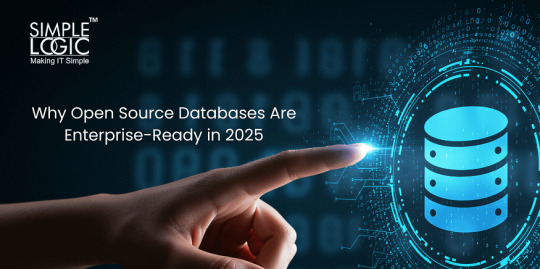
🏆 Top Open Source Databases for Enterprises in 2025
Here’s a breakdown of the most powerful and enterprise-ready open source databases in 2025:
1. PostgreSQL
Known for: Advanced querying, full ACID compliance, strong security features
Ideal for: Complex web applications, analytics, enterprise software
Highlights: JSONB support, partitioning, indexing, high extensibility
2. MySQL
Known for: Speed and reliability
Ideal for: Web and mobile applications, e-commerce platforms
Highlights: Replication, clustering, strong community support
3. MariaDB
Known for: Enterprise level security and speed
Ideal for: Businesses seeking MySQL compatibility with better performance
Highlights: ColumnStore for big data, Galera clustering
4. MongoDB
Known for: NoSQL architecture and flexibility
Ideal for: Applications needing rapid development and large-scale unstructured data
Highlights: Document-oriented model, horizontal scaling, sharding
5. Redis
Known for: Ultra-fast performance and in-memory storage
Ideal for: Real-time applications, caching, session storage
Highlights: Pub/Sub messaging, data persistence, AI model support
6. ClickHouse
Known for: Lightning fast OLAP queries
Ideal for: Data warehousing and real-time analytics
Highlights: Columnar storage, parallel query processing, compression
✅ Benefits of Using Open Source Databases for Enterprises
💰 Cost Savings: No licensing costs; lower TCO
🔧 Customization: Tailor the database to fit unique business needs
🚀 Performance: Handle massive datasets with high speed and reliability
📈 Scalability: Easily scale horizontally or vertically as data grows
🔐 Security: Enterprise ready databases with encryption, access control, and auditing features
🌐 Community & Ecosystem: Global support, extensive documentation, and regular enhancements
🤔 FAQs on Open Source Databases
🔹 Are open source databases suitable for large enterprises?
Absolutely. Many global enterprises, including Fortune 500 companies, rely on open source databases for mission-critical workloads.
🔹 Can open source databases handle high-transaction volumes?
Yes. Databases like PostgreSQL, MySQL and MongoDB are capable of processing millions of transactions per second.
🔹 What if we need enterprise support?
Many open source projects offer commercial support through enterprise editions or certified service providers.
🔹 Are these databases cloud-ready?
Most open source databases are compatible with cloud platforms like AWS, Azure, and Google Cloud, and many even offer Kubernetes support.
🔹 How do open source databases compare to commercial databases?
They often match or exceed commercial solutions in performance and flexibility, without the vendor lock in or heavy licensing costs.
🛠️ Additional Tips for Adopting Open Source Databases
Start with a pilot project to test database performance in a controlled environment
Leverage containerization (Docker, Kubernetes) for deployment flexibility
Ensure your team is trained or partner with a database consulting provider
Monitor and tune performance regularly using tools like pgAdmin, Percona Toolkit, or Prometheus
🧩 Conclusion
Open source databases are no longer just an alternative they are essential tools for modern enterprises. Whether you’re looking for high performance, cost-efficiency, scalability, or agility, the open source ecosystem has a solution tailored for your business needs in 2025.
At Simple Logic, we help enterprises implement, optimize, and manage open source databases with unmatched efficiency and expertise. Whether it’s PostgreSQL, MongoDB, or Redis we ensure your data is always secure, accessible, and scalable.
🚀 Ready to Transform Your Database Strategy?
👉 Switch to enterprise grade open source databases with Simple Logic today! 📩 Reach out now at [email protected] or call +91 86556 16540 💡 Let’s build a database ecosystem that fuels your digital transformation in 2025 and beyond!
#simplelogic#makingitsimple#simplelogicit#makeitsimple#itservices#itconsulting#itcompany#manageditservices#blog#opensource#opensourcedatabase#database#data#databasestrategy#mongodb#mariadb#redis#clickhouse#mysql
0 notes
Text
#DidYouKnow Open Source Databases Power Scalable Systems
Swipe left to explore!
To learn more about Open Source Database Management Click Here 👉 https://simplelogic-it.com/open-source-database-management/
💻 Explore insights on the latest in #technology on our Blog Page 👉 https://simplelogic-it.com/blogs/
🚀 Ready for your next career move? Check out our #careers page for exciting opportunities 👉 https://simplelogic-it.com/careers/
#didyouknowfacts#knowledgedrop#interestingfacts#factoftheday#learnsomethingneweveryday#mindblown#didyouknowthat#triviatime#learnsomethingnew#opensource#opensourcedatabase#mysql#postgrsql#webapplications#analytics#datawarehousing#makeitsimple#simplelogicit#simplelogic#makingitsimple#itservices#itconsulting
0 notes
Text
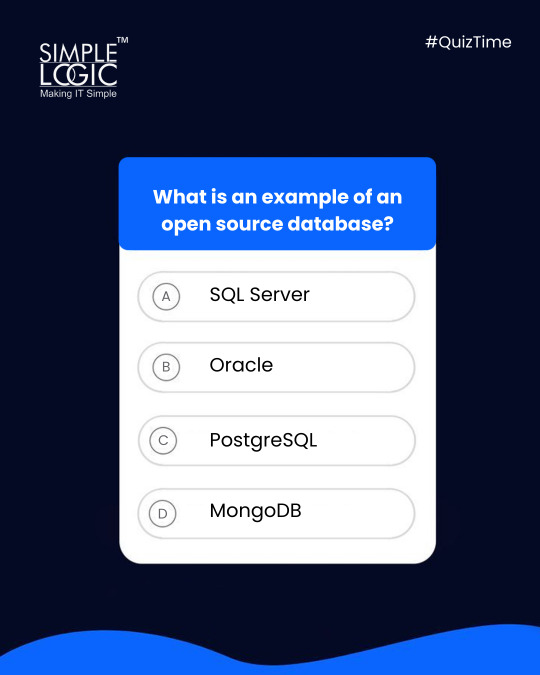
#QuizTime What is an example of an open source database?
A) SQL Server 🖥️ B) Oracle 💾 C) PostgreSQL 🐘 D) MongoDB 🍃
Comments your answer below👇
💻 Explore insights on the latest in #technology on our Blog Page 👉 https://simplelogic-it.com/blogs/
🚀 Ready for your next career move? Check out our #careers page for exciting opportunities 👉 https://simplelogic-it.com/careers/
#quiztime#testyourknowledge#brainteasers#triviachallenge#thinkfast#quizmaster#knowledgeIspower#mindgames#opensource#database#opensourcedatabase#sqlserver#oracle#postgresql#mongodb#funfacts#simplelogicit#makingitsimple#makeitsimple#simplelogic
0 notes
Text
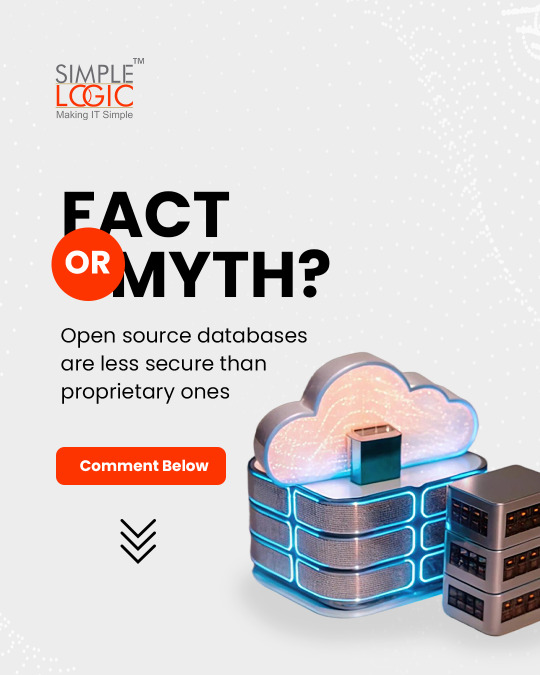
#FactorMyth Open source databases are less secure than proprietary ones💻
Comments your answer below👇
💻 Explore insights on the latest in #technology on our Blog Page 👉 https://simplelogic-it.com/blogs/
🚀 Ready for your next career move? Check out our #careers page for exciting opportunities 👉 https://simplelogic-it.com/careers/
#Fact#Myth#SimpleLogicIT#MakingITSimple#OpenSource#Database#OpenSourceDatabase#Secure#SimpleLogic#MakeITSimple
0 notes
Text

#Guess Can you recognize this logo?
What’s your guess? Comment Below👇
�� Explore insights on the latest in #technology on our Blog Page 👉 https://simplelogic-it.com/blogs/
🚀 Ready for your next career move? Check out our #careers page for exciting opportunities 👉 https://simplelogic-it.com/careers/
#LogoChallenge#TechTrivia#GuessTheLogo#Logo#Terraform#SimpleLogicIT#MakingITSimple#OpenSource#Database#OpenSourceDatabase#OpenSourceInfrastructure#Cloud#SimpleLogic#MakeITSimple#GuessGame#TechLogo
0 notes
Text

#Guess Let's play 'Guess the Logo'! 🤔
Can you recognize this logo? Drop your guesses below 👇
#LogoChallenge#TechTrivia#GuessTheLogo#Logo#MongoDB#OpenSourceDatabase#UnstructuredData#Scalabilty#Data#SimpleLogicIT#MakingITSimple#SimpleLogic#MakeITSimple
0 notes
Text

#FactorMyth Open-source databases are unreliable for enterprise use💻
Comments your answer below👇
💻 Explore insights on the latest in #technology on our Blog Page 👉 https://simplelogic-it.com/blogs/
🚀 Ready for your next career move? Check out our #careers page for exciting opportunities 👉 https://simplelogic-it.com/careers/
#Fact#Myth#SimpleLogicIT#MakingITSimple#OpenSource#Database#OpenSourceDatabase#Enterprise#SimpleLogic#MakeITSimple
0 notes
Text

#Guess Let's play 'Guess the Logo'! 🤔
Can you recognize this logo? Drop your guesses below!👇
#LogoChallenge#TechTrivia#GuessTheLogo#Logo#ElasticSearch#SimpleLogicIT#MakingITSimple#OpenSource#Database#OpenSourceDatabase#ApplicationMonitoring#SimpleLogic#MakeITSimple#GuessGame#TechLogo
0 notes